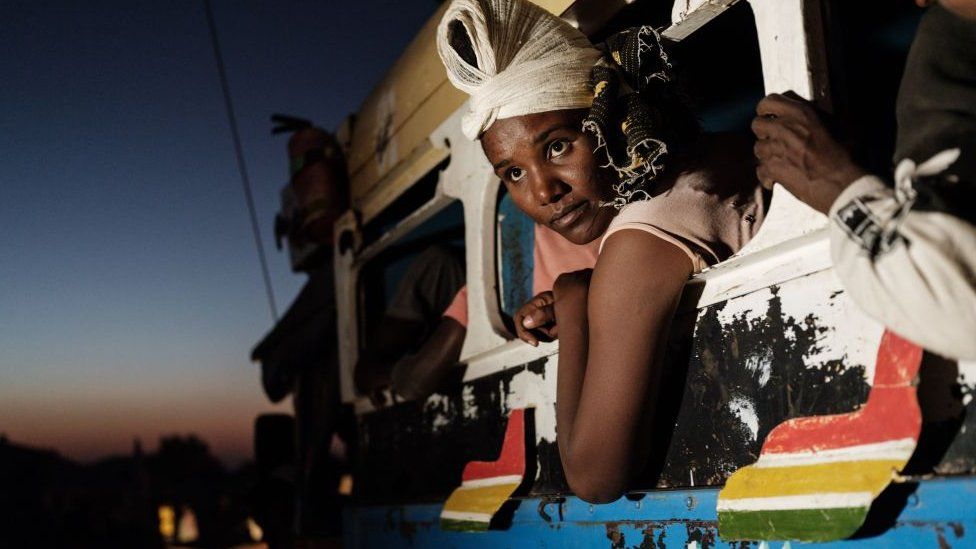Tigrayans are being targeted in a campaign of ethnic cleansing in part of Ethiopia’s conflict-hit northern Tigray region, a joint investigation has found.
Amnesty International and Human Rights Watch (HRW) accuse officials and security forces from neighbouring Amhara of committing war crimes and crimes against humanity in western Tigray – allegations dismissed by Amhara’s regional government.
A 23-year-old Tigrayan trader told investigators how he was beaten up and left for dead in Rawyan by a patrol of Amhara Special Forces, who said: “We will erase you from this land. This land is ours. This is the last time a Tigrayan will live in the area.”
The western part of Tigray has been largely inaccessible to journalists and aid agencies since the war in Tigray erupted in November 2020 – and all lines of communication have been blocked.
It is an area where land and boundary disputes between neighbouring regions and ethnic groups have long caused tensions and resentments.
The conflict – which followed a fallout between Prime Minister Abiy Ahmed’s government and Tigray’s dominant political party – has provided an opportunity to settle old scores.
After the war began, Amhara’s forces, along with their allies in the Ethiopian army, quickly moved in, took control and a new administration was set up in western Tigray.
The 207-page report, covering events between November 2020 and December 2021, is based on interviews with 423 people, mainly survivors of alleged abuses, and satellite images.
Amnesty and HRW say the evidence collected over a year shows that western Tigray has been the site of some of the worst atrocities committed during the 16-month war – and has been largely ignored.
In the first days of the offensive, one of the first large-scale massacres was in Mai Kadra on 9 November. It involved both sides and left around 229 of the town’s residents – both Amhara and Tigrayan – dead.
Afterwards the report says Tigrayans were targeted in revenge attacks by Amhara security forces, their property was pillaged and occupied.
At this time Jamila told how some Amhara militiamen came into her hair salon in the town of Dansha early one morning as she was working. The 27-year-old was raped in front of her children, aged seven and two: “They said: ‘You Tigrayans should disappear from the land west of Tekeze.'”
This refers to the River Tekeze, which splits the western zone of Tigray from the rest of the region.
Once in control of western Tigray, interviewees said the new authorities banned the speaking of Tigrinya and put in place policies to push Tigrayans out, distributing leaflets with a 24-hour or 72-hour ultimatum to leave or be killed.
Three survivors told investigators about the massacre of about several dozen Tigrayan men near the Tekeze River Bridge on 17 January 2021 – an incident that prompted many people to flee.

Militias rounded up Tigrayan men in the town of Adi Goshu and took about 60 of them to the Tekeze River where they were lined up in rows and shot.
Mesfin said: “They shot all of us, me included. I was shot in my right shoulder and right hand. Bodies were falling one after the other.
“I woke up at around 4am… I saw so many dead bodies around me,” the 57-year-old said.
“Some cow herders found me when I entered the forest. They took me to the people hiding in the forest. They treated me there, until I recovered… I lost my son and son-in law that day.”
The report also details how Tigrayan livestock, crops and homes were targeted and how security forces have tortured and deprived people of food.
“This campaign of ethnic cleansing was conducted through a series of human rights abuses, including mass detention and torture, sexual violence, extrajudicial killings, denial of humanitarian aid and forced expulsion of Tigrayans,” Amnesty researcher Fisseha Tekle told the BBC.
The two rights groups say that hundreds of Tigrayans remain unlawfully detained and have called for their immediate release.
They also want militias to be disarmed, officials linked to the abuses suspended and have called for an African Union-led international peacekeeping force to be deployed to western Tigray.
The conflict has forced millions of people to flee their homes – and left hundreds of thousands on the brink of famine.
The war is continuing – though a humanitarian truce was declared less than two weeks ago that has seen several lorries of food make it to the capital of Tigray for the first time in months.
However, Amnesty says the western Tigray region is still not getting the help it needs.
During the conflict both sides have been accused of atrocities.
In particular, Ethiopian and Eritrean forces were accused of carrying out massacres in Tigray’s holy city of Aksum and using widespread sexual violence, while Tigrayan forces face accusations of war crimes when they invaded Amhara last year.


More on the conflict:
Around the BBC


























